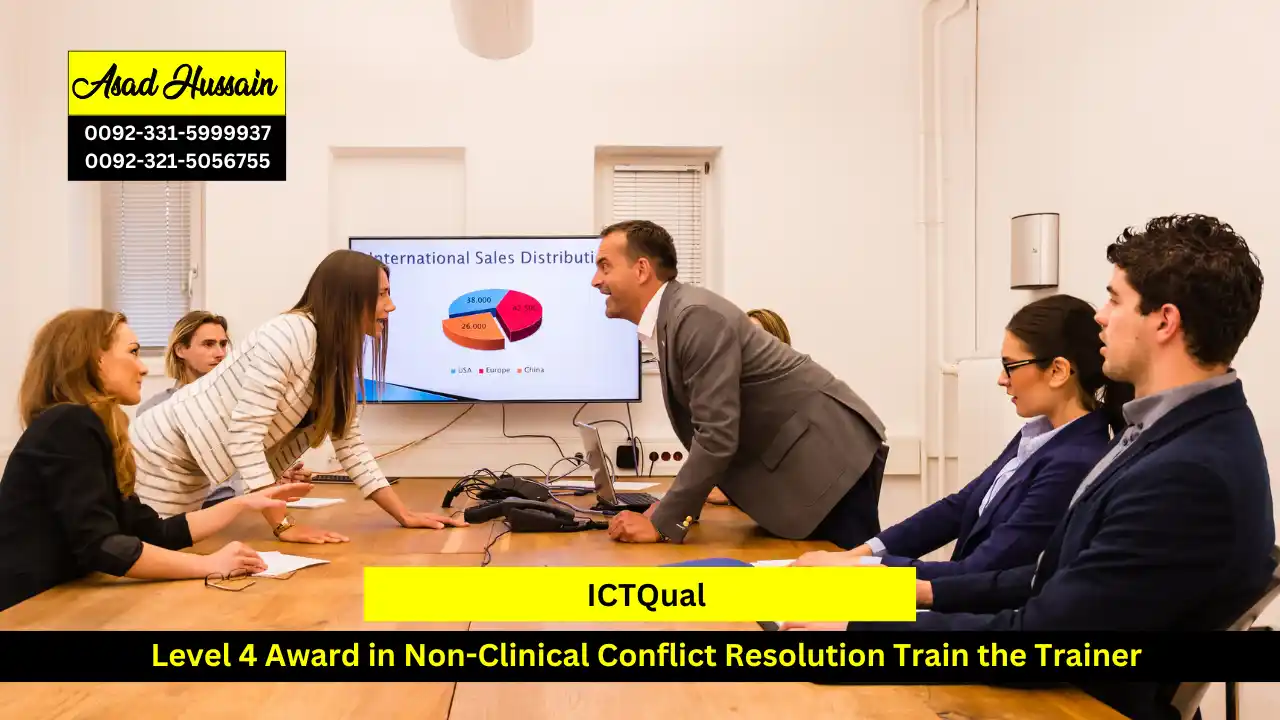Conflict resolution is a crucial skill in any professional setting, where effective management of disputes can foster a more productive and harmonious work environment. The ICTQual Level 4 Award in Non-Clinical Conflict Resolution Train the Trainer program equips individuals with the expertise to train others in this essential skill set.
The ICTQual Level 4 Award focuses specifically on non-clinical conflict resolution, addressing conflicts that arise in organizational, community, or interpersonal contexts outside of clinical or medical settings. The training not only emphasizes theoretical knowledge but also practical techniques that trainers can impart to their trainees.
The ICTQual Level 4 Award in Non-Clinical Conflict Resolution Train the Trainer is not just a certification but a gateway to promoting harmonious relationships and effective communication within workplaces and communities. By equipping trainers with the skills to navigate and resolve conflicts, the program contributes to fostering healthier and more productive environments where individuals can thrive.
Program Highlights
Mandatory Units
- Introduction to Conflict Resolution Training
- Fundamentals of Conflict Dynamics
- Communication Skills for Conflict Resolution
- Mediation and Negotiation Techniques
- Training Design and Delivery
- Assessing Learning and Providing Feedback
- Ethical and Legal Considerations in Conflict Resolution Training
- Practical Application and Role-Playing Exercises
- Developing Training Resources and Materials
- Continuous Professional Development and Growth
- Candidates applying for the Level 4 Award in Non-Clinical Conflict Resolution Train the Trainer course should possess a minimum educational qualification equivalent to a high school diploma or its international equivalent. A higher level of education, such as a bachelor’s degree, may be preferred but is not always mandatory.
- While prior experience in conflict resolution or related fields is not always required, applicants should ideally have some professional background or exposure to working in environments where conflict resolution skills are valuable. Relevant experience may include roles in human resources, management, team leadership, education, or community engagement.
- Proficiency in verbal and written communication is essential for effective participation in this course. Applicants should be able to communicate fluently in the language of instruction and demonstrate a clear understanding of written materials.
- Successful candidates should demonstrate a genuine interest in conflict resolution and a commitment to acquiring the necessary skills to become effective trainers in this field. A strong motivation to contribute positively to conflict resolution efforts within their organizations or communities is highly desirable.
- As some aspects of the course may involve online learning platforms or electronic resources, applicants should have basic computer literacy skills, including the ability to navigate the internet, use email, and access course materials online.
Introduction to Conflict Resolution Training
- Understand the importance and relevance of conflict resolution in non-clinical settings.
- Identify different types of conflict and their potential impacts on organizations and individuals.
- Recognize the role of a trainer in conflict resolution and the objectives of conflict resolution training.
Fundamentals of Conflict Dynamics
- Analyze the underlying causes and stages of conflict.
- Differentiate between constructive and destructive conflict.
- Apply theories of conflict dynamics to real-world scenarios.
Communication Skills for Conflict Resolution
- Demonstrate effective communication techniques, including active listening and assertive communication.
- Identify barriers to effective communication and strategies to overcome them.
- Utilize non-verbal communication skills to enhance conflict resolution efforts.
Mediation and Negotiation Techniques
- Implement mediation techniques to facilitate dialogue and resolution between conflicting parties.
- Apply negotiation strategies to reach mutually beneficial outcomes.
- Manage emotions and maintain impartiality during mediation and negotiation processes.
Training Design and Delivery
- Design comprehensive training sessions that address key conflict resolution concepts and skills.
- Utilize various instructional methods, such as case studies, role-playing, and group discussions.
- Adapt training delivery to meet the needs of diverse learners.
Assessing Learning and Providing Feedback
- Develop assessment tools to measure trainee understanding and skill development.
- Provide constructive feedback to trainees to enhance their learning experience.
- Evaluate the effectiveness of training sessions and make necessary improvements.
Ethical and Legal Considerations in Conflict Resolution Training
- Identify ethical dilemmas that may arise in conflict resolution training.
- Understand the legal implications and responsibilities of a conflict resolution trainer.
- Promote ethical standards and practices in all training activities.
Practical Application and Role-Playing Exercises
- Facilitate practical exercises that allow trainees to apply conflict resolution techniques in simulated scenarios.
- Evaluate trainee performance in role-playing exercises and provide targeted feedback.
- Encourage reflective practice to enhance learning and skill retention.
Developing Training Resources and Materials
- Create engaging and informative training materials that support learning objectives.
- Utilize multimedia and technology to enhance training delivery.
- Ensure training resources are up-to-date and relevant to current best practices.
Continuous Professional Development and Growth
- Recognize the importance of ongoing professional development in conflict resolution training.
- Identify opportunities for further learning and skill enhancement.
- Engage in reflective practice and seek feedback to continuously improve as a trainer.
The ICTQual Level 4 Award in Non-Clinical Conflict Resolution Train the Trainer is designed for professionals who are passionate about fostering harmonious and productive environments in various settings. This course is ideal for human resource managers, team leaders, educators, consultants, and anyone responsible for managing or training others in conflict resolution. It caters to those seeking to enhance their skills in mediation, negotiation, and effective communication, as well as individuals aspiring to become certified trainers in conflict resolution. Whether you are looking to elevate your career, improve workplace dynamics, or develop comprehensive training programs, this course provides the essential knowledge and practical techniques to empower others in resolving conflicts constructively.







